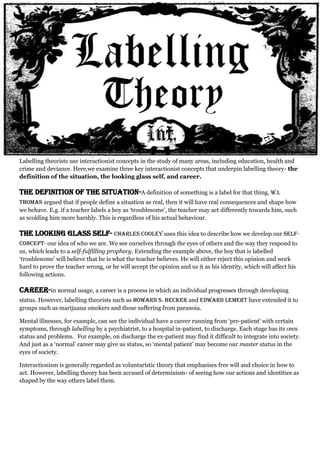Recommended
KAFKAS ÜNİVERSİTESİ/KAFKAS UNIVERSITY
SOCIOLOGY
Course
LECTURE NOTES AND POWER POINT PRESENTATIONS
Prof.Dr. Halit Hami ÖZ
Kars, TURKEY
hamioz@yahoo.com
Prof.dr. halit hami öz sociology-chapter 7-deviance, crime, and social control

Prof.dr. halit hami öz sociology-chapter 7-deviance, crime, and social controlProf. Dr. Halit Hami Öz
More Related Content
What's hot
KAFKAS ÜNİVERSİTESİ/KAFKAS UNIVERSITY
SOCIOLOGY
Course
LECTURE NOTES AND POWER POINT PRESENTATIONS
Prof.Dr. Halit Hami ÖZ
Kars, TURKEY
hamioz@yahoo.com
Prof.dr. halit hami öz sociology-chapter 7-deviance, crime, and social control

Prof.dr. halit hami öz sociology-chapter 7-deviance, crime, and social controlProf. Dr. Halit Hami Öz
What's hot (20)
CAPE SOCIOLOGY UNIT TWO Is crime socially constructed

CAPE SOCIOLOGY UNIT TWO Is crime socially constructed
Prof.dr. halit hami öz sociology-chapter 7-deviance, crime, and social control

Prof.dr. halit hami öz sociology-chapter 7-deviance, crime, and social control
Sociology Unit 2 Labelling an individual as deviant leads to a self fulfillin...

Sociology Unit 2 Labelling an individual as deviant leads to a self fulfillin...
Viewers also liked
Viewers also liked (12)
Similar to Labelling theory
Similar to Labelling theory (13)
Self Concept, Self Image, Self Esteem & Ideal Self

Self Concept, Self Image, Self Esteem & Ideal Self
LECTURE 10 (WORKING WITH INDIVIDUALS AND GROUPS).pdf

LECTURE 10 (WORKING WITH INDIVIDUALS AND GROUPS).pdf
Lesson-3-The-Self-as-Cognitive-Construct-GROUP-3.pptx

Lesson-3-The-Self-as-Cognitive-Construct-GROUP-3.pptx
Contribution of self concept in guidance and counselling among students

Contribution of self concept in guidance and counselling among students
More from Ellie Fleming
More from Ellie Fleming (20)
Labelling theory
- 1. Labelling theorists use interactionist concepts in the study of many areas, including education, health and crime and deviance. Here,we examine three key interactionist concepts that underpin labelling theory- the definition of the situation, the looking glass self, and career. The definition of the situation-A definition of something is a label for that thing. W.I. Thomas argued that if people define a situation as real, then it will have real consequences and shape how we behave. E.g. if a teacher labels a boy as ‘troublesome’, the teacher may act differently towards him, such as scolding him more harshly. This is regardless of his actual behaviour. The looking glass self- Charles Cooley uses this idea to describe how we develop our self- concept- our idea of who we are. We see ourselves through the eyes of others and the way they respond to us, which leads to a self-fulfilling prophecy. Extending the example above, the boy that is labelled ‘troublesome’ will believe that he is what the teacher believes. He will either reject this opinion and work hard to prove the teacher wrong, or he will accept the opinion and us it as his identity, which will affect his following actions. Career-in normal usage, a career is a process in which an individual progresses through developing status. However, labelling theorists such as Howard S. Becker and Edward Lemert have extended it to groups such as marijuana smokers and those suffering from paranoia. Mental illnesses, for example, can see the individual have a career running from ‘pre-patient’ with certain symptoms, through labelling by a psychiatrist, to a hospital in-patient, to discharge. Each stage has its own status and problems. For example, on discharge the ex-patient may find it difficult to integrate into society. And just as a ‘normal’ career may give us status, so ‘mental patient’ may become our master status in the eyes of society. Interactionism is generally regarded as voluntaristic theory that emphasises free will and choice in how to act. However, labelling theory has been accused of determinism- of seeing how our actions and identities as shaped by the way others label them.

